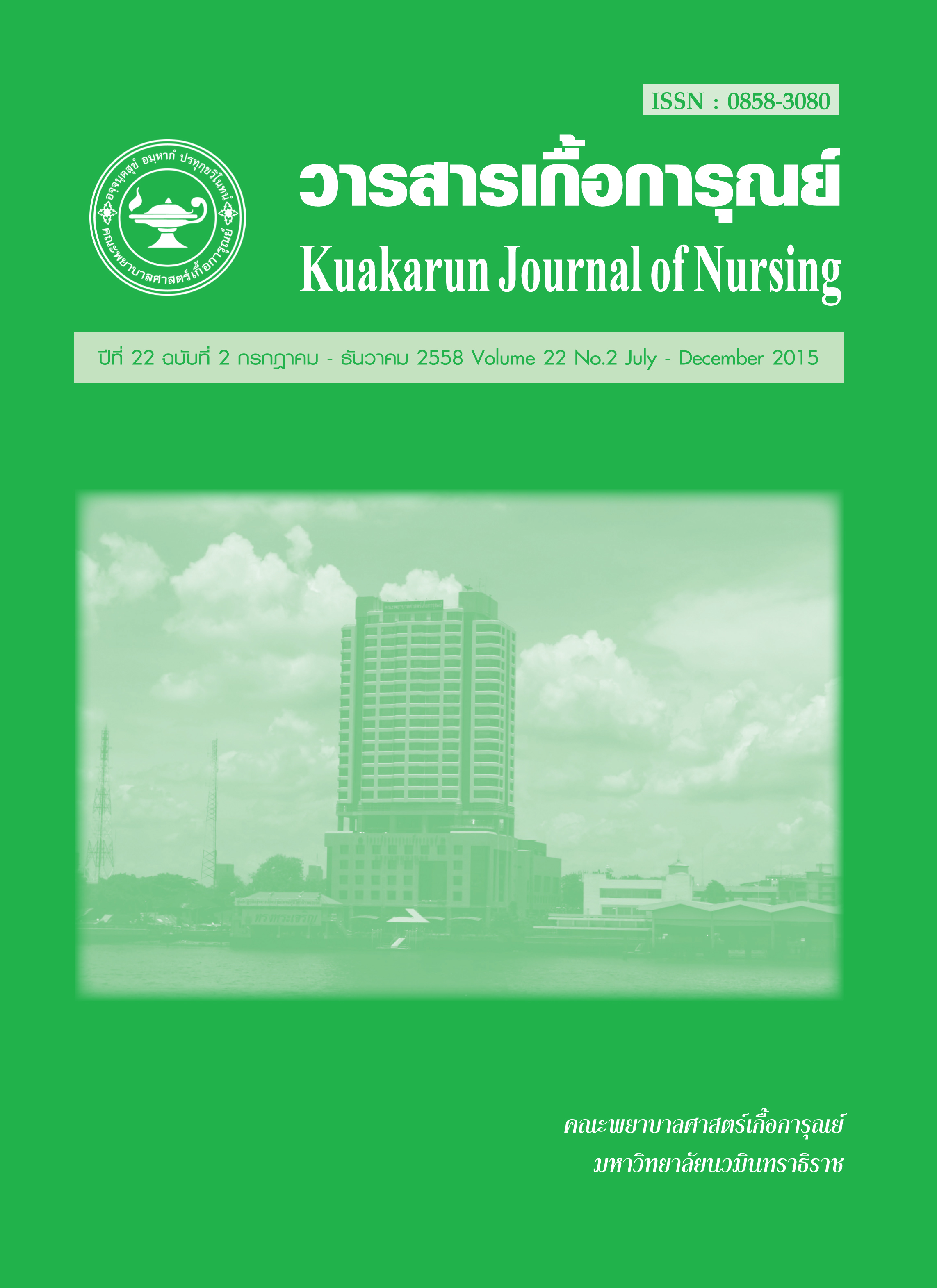บทบาทพยาบาลไตเทียมกับการป้องกันและการจัดการภาวะน้ำเกิน ของผู้ป่วยโรคไตวายเรื้อรังระยะสุดท้ายที่ฟอกเลือดด้วยเครื่องไตเทียม Hemodialysis Nurses’ Role in Prevention and Management Volume Overload in End Stage of Renal Failure Patient on Receiving Hemodialy
คำสำคัญ:
บทบาทพยาบาลไตเทียม, ภาวะน้ำเกิน, ผู้ป่วยโรคไตวายเรื้อรังระยะสุดท้ายบทคัดย่อ
ผู้ป่วยโรคไตวายเรื้อรังระยะสุดท้ายที่รักษาด้วยการฟอกเลือดด้วยเครื่องไตเทียม จำเป็น ต้องได้รับการรักษาอย่างต่อเนื่องโดยการฟอกเลือด 2-3 ครั้งต่อสัปดาห์ ซึ่งปัจจุบันพบว่าจำนวน ผู้ป่วยที่ได้รับการรักษารูปแบบนี้มีจำนวนเพิ่มมากขึ้นและภาวะน้ำเกินเป็นภาวะแทรกซ้อนหลัก ที่พบในผู้ป่วยกลุ่มนี้นอกจากจะทำให้ผู้ป่วยไม่สุขสบายแล้ว ยังเป็นสาเหตุให้โรคอื่นแสดงอาการ แทรกซ้อนที่รุนแรงตามมา ในรายที่มีภาวะน้ำเกินอย่างเฉียบพลันจะทำให้เกิดการเสียชีวิตอย่าง รวดเร็วจากโรคหัวใจกำเริบที่รุนแรง ซึ่งบางครั้งสาเหตุของการเกิดภาวะน้ำเกินสามารถป้องกัน และจัดการได้ พยาบาลไตเทียมในฐานะบุคลากรที่ดูแลหลักในการป้องกันรักษาและให้การบำบัด ทางการพยาบาลที่เกี่ยวข้องกับภาวะดังกล่าว มี 3 บทบาทที่สำคัญ ดังนี้ 1) บทบาทการป้องกัน การเกิดภาวะน้ำเกิน โดยการสนับสนุนให้ผู้ป่วยมีความสามารถในการดูแลตนเองเพื่อควบคุมน้ำ และการให้คำแนะนำและให้ความรู้แก่ผู้ป่วยเพื่อการปรับเปลี่ยนวิถีชีวิตเพื่อควบคุมน้ำ 2) บทบาทการดูแลผู้ป่วยที่มารับการฟอกเลือดปกติ โดยการดูแลผู้ป่วยที่มาฟอกเลือดตามปกติ ตั้งแต่ผู้ป่วยเริ่มมารอรับการฟอกเลือดด้วยเครื่องไตเทียม ขณะฟอกเลือดและหลังการฟอกเลือด ด้วยเครื่องไตเทียมซึ่งมีความสำคัญมากที่จะช่วยดูแลผู้ป่วยกลุ่มนี้ได้รับการฟอกเลือดขจัด ของเสียและดึงน้ำส่วนเกินออก 3) บทบาทการจัดการภาวะน้ำเกินกรณีฉุกเฉินเร่งด่วน เมื่อผู้ป่วยเกิดภาวะน้ำเกินที่แสดงอาการหอบเหนื่อยฉุกเฉินนอกเวลาทำการปกติของคลินิก ไตเทียม หากผู้ป่วยมาพบแพทย์และแพทย์สั่งการรักษาผู้ป่วยด้วยการฟอกเลือดอย่างเร่งด่วน เพื่อลดอาการหรือช่วยชีวิตผู้ป่วย พยาบาลไตเทียมต้องแสดงบทบาทกึ่งอิสระตามการประเมิน สภาพผู้ป่วยที่เป็นปัจจุบัน เริ่มฟอกเลือดโดยการดึงน้ำส่วนเกินออกอย่างรวดเร็วเพื่อช่วยเหลือ ลดอาการไม่สุขสบายผู้ป่วยที่สอดคล้องกับแผนการรักษาของแพทย์
Hemodialysis Nurses’ Role in Prevention and Management Volume Overload in End Stage of Renal Failure Patient on Receiving Hemodialysis
End stage renal disease patients, on receiving hemodialysis need hemodialysis continuing treatment 2-3 times /week. Currently, the numbers of these patients are rapidly increasing and volume overload is a major complication. The volume overload contributes patient discomfort and induces other disease symptoms and complications. Some patients with persistent acute volume overload had a sudden death from severe heart attack, with is a preventable and manageable cause of death. Hemodialysis nurses are a key person to prevent and provide vital role in caring of those patients. Hemodialysis nurses have three important roles. First, prevention in exceed volume overload role by encouraging the patient to do self-care of volume control and educating them for a healthy. Second, role of hemodialysis care in normal cases by mean assessment and monitoring of the patients in pre-hemodialysis, inter-hemodialysis and post-hemodialysis in order to help patients receiving dialysis appropriately. Third, management role in emergency patients with severe dyspnea caused by volume at the over load over time hemodialysis clinics. Whenever the overload conditions comes to the hospital and physician treatsing them with hemodialysis immediately for urgently reduce symptoms or rescue the nurses must perform their semi-independent roles to evaluate the present conditions starting from assessment unit hemodialysis to reduce patients discomfort and provide nursing care comply with the physician treatment plans.

















